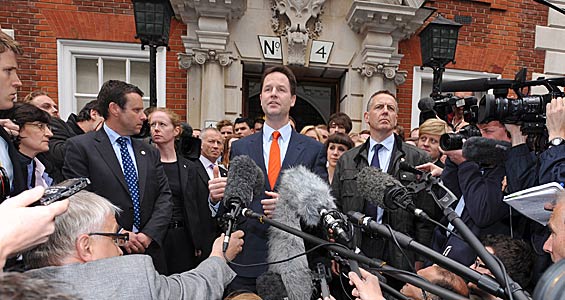Lib Dems face difficult dilemma
The UK’s third party finds itself kingmaker after election but faces a tough decision.
 |
| Clegg has found himself centre stage after UK elections produced a hung parliament [EPA] |
Despite losing five seats in a general election in which they were widely expected to increase their representation, Britain’s Liberal Democrats find themselves as kingmakers in the post-election hiatus of a hung parliament.
Final results on Friday gave the main opposition Conservative party the most seats with 306 constituencies, while the ruling Labour party trailed second with 258 and the Liberal Democrats took 57.
Nick Clegg, the Liberal Democrat leader, made a clear overture to David Cameron, the leader of the Conservatives, early on Friday when he said that Cameron’s party, having taken the most seats, had “the first right to seek government”.
That was met with a clear response from Cameron, who said he was making a “big, open and comprehensive” offer to the Liberal Democrats to help form a majority government.
‘Desperate politician’
Cameron’s wooing included a number of tempting inducements for Clegg’s party, ranging from the scrapping of ID cards to support for low carbon industries.
But on the issue that the Liberal Democrats have made the centrepiece of their electoral campaign, the radical reform of the country’s electoral system, the Conservative leader would merely promise an “all party committee of inquiry on political and electoral reform”.
| special report |
 |
Enter stage right Gordon Brown, Britain’s beleagured prime minister, as he desperately tries to cling to power in the aftermath of the poll.
While allowing that the Conservatives and Liberal Democrats could continue their deliberations, Brown made it equally clear that he was prepared to deliver immediate legislation for a referendum on electoral reform if Clegg was prepared to keep him in Downing Street.
Such an alliance between the Labour and the Liberal Democrats, already being dubbed a “coalition of the losers,” would see Clegg propping up a prime minister he described during the election as a “desperate politician” and whose party he declared had been “a stubborn block to reform and progress” for 13 years.
‘Triple-lock’ mechanism
If Clegg accepts a formal coalition with either party he is then faced with what is known as his party’s “triple-lock” policy.
The mechanism, introduced by Paddy Ashdown, a former Liberal Democrat leader, means that Clegg would need the agreement of his MPs, the party’s executive and the membership before he could enter into government with either of the two larger parties.
The “triple-lock” rules state that any agreement that “could affect the party’s independence of political action” requires the support of 75 per cent of the parliamentary Liberal Democrat party, and 75 per cent of the party’s federal executive (and failing that the support of two-thirds of the wider party).
Some political analysts have suggested that one way of getting around the “triple-lock” policy would be for the Liberal Democrats to support either party on a bill-by-bill basis, rather than in any formal coalition, with Clegg then avoiding having to put such a deal to the membership for a vote.
As Clegg begins weekend consultations with his party, he is currently faced with one offer that fails to provide the Liberal Democrats with their most cherished ambition and another in which it props up a government whose policies it has consistently criticised.
Reaching a decision could end up being a long and cumbersome process and even then there is no guarantee Clegg would get support for any agreement.
It is a difficult dilemma for the Liberal Democrat leader and Cameron’s appeal for a “quick” agreement looks increasingly optimistic.